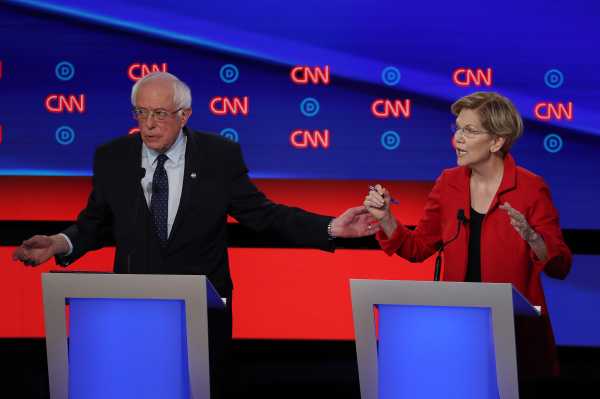
Just ahead of the second round of democratic debates, Sen. Elizabeth Warren released a trade policy plan that extends her “economic patriotism” agenda to trade policy, asserting that free trade has benefited “big multinational corporations and international capital at the expense of American workers.”
Unfortunately, despite some bright spots regarding human rights, Warren’s plan is merely another voice in the chorus of misguided progressive condemnations of trade we’ve seen from people like Sen. Bernie Sanders, Rep. Tulsi Gabbard, and the Congressional Progressive Caucus.
Progressives’ anti-trade stance is wrongheaded and ultimately hamstrings Americans’ well-being and global economic growth. Trade isn’t nearly as bad for American jobs as many progressives argue it to be — and is an often unrecognized boon to American families and businesses.
Ahead of the 2020 elections, the left must not merely condemn the deleterious effects of trade, but also recognize the tremendous political and economic benefits free trade has provided for Americans across the country.
Progressives and the politics of trade
The Trump administration has been characterized by a series of ham-fisted and vindictive trade policies. The trade war with China has resulted in higher prices for everyday consumer goods and has left farmers throughout the country watching their crops rot and incomes evaporate without access to the export markets they’ve cultivated for decades. The government recently announced a $16 billion plan to compensate farmers for the losses they’ve suffered from this entirely avoidable trade war.
Within just a few months of the trade war beginning, there was a surge in Americans’ support for free trade in response to President Trump’s disastrous trade policies. The poll, conducted by the Chicago Council on Global Affairs in 2018, found that 84 percent of Democrats believe that “international trade is good for the US economy”; 71 percent also believed that trade bolsters job creation.
Given this, you might expect the slew of progressive Democrats vying to be the party’s presidential nominee to embrace free trade. Instead, candidates are deriding free trade as a threat to American workers and advocating for protectionism.
Yet during both nights of the second Democratic debate, free trade was condemned. Warren asserted that trade deals “have become a way for giant multinationals to change the regulatory environment so they can suck more profits out for themselves and to leave the American people behind.” Gabbard suggested that free trade deals “give away the sovereignty of the American people and our country.”
Sanders, troublingly, seemed to suggest that his administration would use federal contracting opportunities to punish firms; he stated “these guys line up at the federal trough. They want military contracts. They want all kinds of contracts. Well, under my administration, you ain’t going to get those contracts if you’re throwing American workers out on the street.”
The unwillingness of many progressives, including frontrunners Warren and Sanders, to engage with the benefits of free trade is bad politics and bad policy. Free trade helps American families afford the things they buy every day, is integral to the way American businesses produce their goods, and has a positive effect on international relations by promoting democratization abroad.
The effect of trade on the American economy
Working-class Americans and American businesses both benefit from free trade. The Peterson Institute for International Economics estimates that the expansion in free trade between 1950 and 2016 “generated annual and recurring income gains of roughly $2.1 trillion in 2016 for the United States.”
This translates to an $18,000 increase in the income of American households, in part due to more affordable imported consumer goods. Of particular note for progressives concerned with working-class families’ well-being is the study’s suggestion that poorer families in particular benefited from the expansion of trade.
American producers also benefit from more affordable imports: A 2013 Chamber of Commerce study found that 60 percent of American imports are bought by American factories and farms. These imports are critical aspects of these American businesses, serving as inputs to American production.
Imports are, in these instances, complementary to the American economy — not a substitute for the goods we’re producing within our borders. In fact, making it harder for companies and farms to access these inputs would seriously hamstring the American economy.
In lieu of emphasizing the benefits of free trade for American consumers and businesses, progressives often deride free trade as a job killer. In fact, many of the job losses in manufacturing come not from free trade but, according to a 2018 report from the Urban Institute, from increased productivity.
Relatedly, stagnant wages should not be attributed to free trade — the Peterson Institute found that less than 10 percent of the gap between American workers’ productivity and compensation can be explained by global competition. Furthermore, a 2016 study by Trade Partnership Worldwide, a consulting firm specializing in international trade, estimated that “every U.S. state has realized net employment gains directly attributable to trade.”
Free trade is neither the job killer nor the wage slasher that many have portrayed it to be. Because the benefits of trade are diffuse and quotidian, while the drawbacks of free trade are concentrated (and often politicized), it is easy to overlook the fact that the former is greater than the latter.
The effect of trade on world politics
Progressive candidates have articulated the threat that rising inequality and kleptocracy pose to American interests. Warren’s plan attempts to connect American trade policy to American values, a laudable and critical endeavor.
Yet by making these characteristics a precondition for entrance into free trade agreements, as Warren has, this plan merely contributes to the suffering of those who live in closed economies and oppressive societies.
Protectionist policies are linked to increased corruption and are more likely to bolster the disproportionate influence of the wealthiest in society, who will be best posed to lobby for benefits and protection.
Furthermore, there’s compelling evidence describing a process of mutual reinforcement between democratization and entrance into preferential trade agreements. In short, the problem facing the international community today isn’t free trade — it’s insufficient economic regulation and poor governance.
Free trade also provides opportunities for America to broker strong partnerships; protectionism is both immiserating and isolating. Take, for example, the abandoned Trans-Pacific Partnership, a vast free trade agreement the Obama administration negotiated with 12 countries including Australia, Japan, and Vietnam, and which the Trump administration pulled out of.
The TPP was not merely a means of bolstering the American economy (though it certainly was designed to do that); it was also a means for the United States to place pressure on China and to protect American security interests in the region.
By abandoning it (a move both Sanders and Warren encouraged), the US has stepped away from a trade agreement that included “the most robust enforceable environment commitments of any trade agreement in history,” according to the United States Trade Representative, and which sought to put an end to child labor. It’s also allowed China to advance its interests in the region.
Advancing American interests abroad through cooperative agreements that allow states to engage in democratic reforms, without depending on the military, is exactly what progressives say they want to do. Smart free trade agreements — not protectionist measures — are the best way to pursue these objectives.
Harnessing free trade for progressive objectives
Progressives must recognize that domestically, the problem with free trade as it is currently practiced is in the distribution of gains from trade and the lack of protections for those workers who lose their jobs as a result of international trade.
The best means of supporting those who lose their jobs as a result of the American economy’s shift toward producing other types of goods isn’t regaining American competitiveness in that sector. Because the American economy is “capital rich” relative to the rest of the world, increasing free trade will benefit capital-intensive industries.
Though some in the party have considered this a result of nefarious lobbying by “big business,” the Heckscher-Ohlin model (which since its publication in the 1930s has become integral to our understanding of the patterns of international trade) predicts this as a natural outgrowth of America’s factor endowment.
Though multinational corporations have certainly thrown their weight around in trade deals to advance their interests, limiting their influence in trade negotiations will not eradicate the American economy’s comparative advantage in producing capital-rich products.
Progressive Democrats should be designing and advocating for policies that distribute the gains from trade and ensure that those who bear the burden of a shifting American economy are not left behind. One way of doing so is to ensure those who lose their jobs have access to retraining programs that integrate them into the modern American economy.
The Congressional Progressive Caucus’s Principles for Trade calls for an expansion of the Trade Adjustment Assistance (TAA) — a viable policy that has not been given its due by the Democratic presidential contenders. Previous assessments both by and for the US government of the TAA have found it is an inadequate response to the needs of displaced workers.
When pressed on this issue during the second Democratic debate, South Bend, Indiana, Mayor Pete Buttigieg dodged the question, stating, “Of course we need to do retraining. We’re doing it now in South Bend,” before pivoting to a discussion of the “gig economy.” Warren’s plan doesn’t engage with the issue of displaced workers or worker retraining at all.
Warren’s plan to connect American values to our trade deals — by ensuring that the rights of workers be respected and the environment protected — is an excellent idea. And her plan to work with the World Trade Organization to create a “non-sustainable economy” designation for countries with “systematically poor labor and environmental practices” is innovative and shows how progressives can leverage international institutions to advance progressive principles at home and abroad.
However, other aspects of the plan, such as making compliance with a number of standards (many of which the United States does not currently meet) a precondition for entering into new trade agreements, overlook how free trade and integration into the international community can foster democratization among our trading partners. A progressive trade plan must allow for our trade partners to use the benefits they reap from trade to finance and build support for democratic reform within their borders.
Progressives’ current stance ignores the vast benefits of free trade; ahead of the 2020 elections, it is vital for both progressives’ electoral viability and the well-being of Americans that they refrain from using free trade as a scapegoat.
Progressive democrats should be designing trade policies that promote free trade while providing a more robust and compassionate safety net — government policies that tax and redistribute the gains from trade so that all Americans can benefit from free trade should be as central to progressives’ policy agenda as a progressive income tax and universal health care.
Hilary Matfess is a PhD student in political science at Yale University. Find her on Twitter @HilaryMatfess.
Sourse: vox.com






